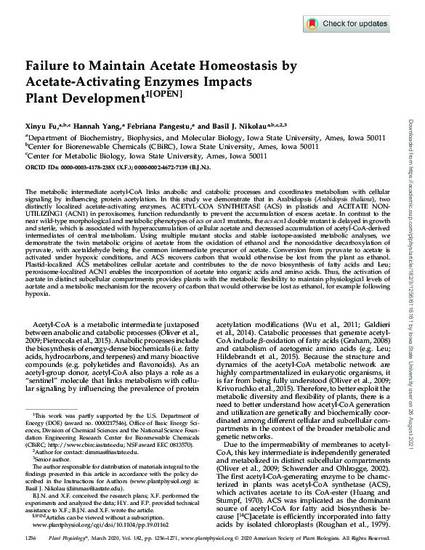
The metabolic intermediate acetyl-CoA links anabolic and catabolic processes and coordinates metabolism with cellular signaling by influencing protein acetylation. In this study we demonstrate that in Arabidopsis (Arabidopsis thaliana), two distinctly localized acetate-activating enzymes, ACETYL-COA SYNTHETASE (ACS) in plastids and ACETATE NON-UTILIZING1 (ACN1) in peroxisomes, function redundantly to prevent the accumulation of excess acetate. In contrast to the near wild-type morphological and metabolic phenotypes of acs or acn1 mutants, the acs acn1 double mutant is delayed in growth and sterile, which is associated with hyperaccumulation of cellular acetate and decreased accumulation of acetyl-CoA-derived intermediates of central metabolism. Using multiple mutant stocks and stable isotope-assisted metabolic analyses, we demonstrate the twin metabolic origins of acetate from the oxidation of ethanol and the nonoxidative decarboxylation of pyruvate, with acetaldehyde being the common intermediate precursor of acetate. Conversion from pyruvate to acetate is activated under hypoxic conditions, and ACS recovers carbon that would otherwise be lost from the plant as ethanol. Plastid-localized ACS metabolizes cellular acetate and contributes to the de novo biosynthesis of fatty acids and Leu; peroxisome-localized ACN1 enables the incorporation of acetate into organic acids and amino acids. Thus, the activation of acetate in distinct subcellular compartments provides plants with the metabolic flexibility to maintain physiological levels of acetate and a metabolic mechanism for the recovery of carbon that would otherwise be lost as ethanol, for example following hypoxia.
Available at: http://works.bepress.com/basil-nikolau/62/

This article is published as Fu, Xinyu, Hannah Yang, Febriana Pangestu, and Basil J. Nikolau. "Failure to Maintain Acetate Homeostasis by Acetate-Activating Enzymes Impacts Plant Development." Plant physiology 182, no. 3 (2020): 1256-1271. doi:10.1104/pp.19.01162.